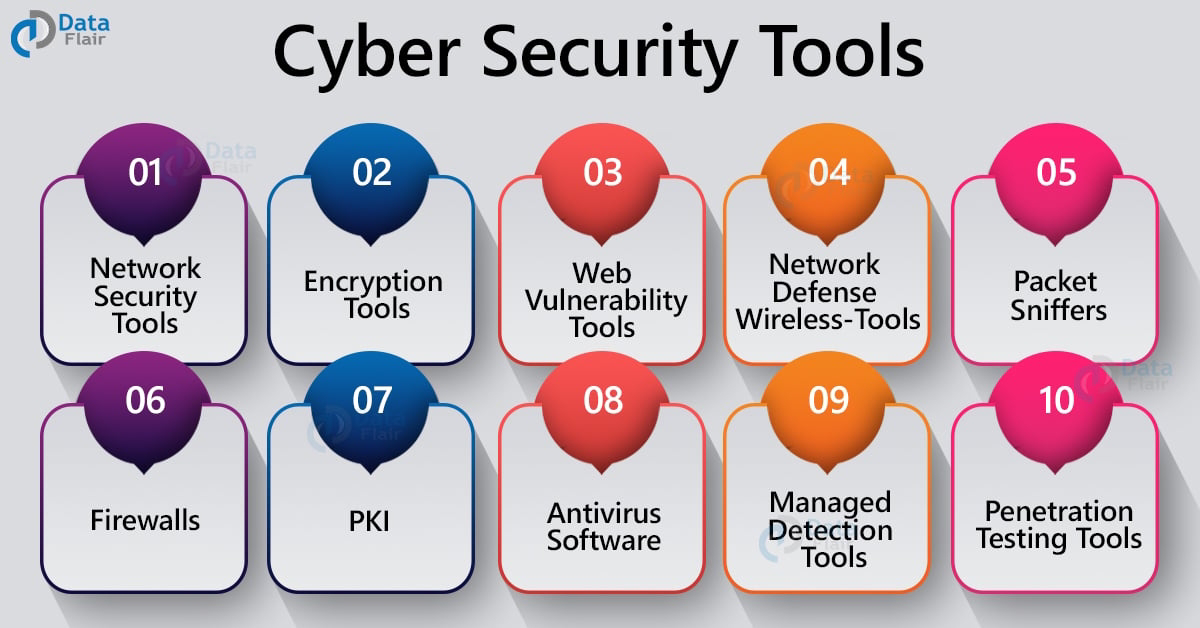Top 5 Online Security Tools for Cyber Security
Top 5 Online Security Tools for Cyber Security
VPN (Virtual Private Network) -
A VPN encrypts your internet connection and hides your online activity, making it much more difficult for hackers to intercept your data or track your online activity. Some popular VPNs include ExpressVPN, NordVPN, and Surfshark.
Antivirus software -
Antivirus software helps protect your computer from malware, viruses, and other online threats. Popular options include Norton, McAfee, and Avast.
Password manager -
Password managers can help you generate strong, unique passwords for all your online accounts and store them securely. Some popular password managers include LastPass, Dashlane, and 1Password.
Two-factor authentication -
Two-factor authentication (2FA) adds an extra layer of security to your online accounts by requiring a second form of authentication, such as a text message or app notification, in addition to your password. Many popular services offer 2FA, including Google, Facebook, and Twitter.
Ad-blocker -
Ad-blockers help prevent malicious ads from appearing on websites you visit, which can contain malware or phishing links. Popular ad-blockers include AdBlock Plus, uBlock Origin, and Ghostery.
Top 5 Online Security Tools for Cyber Security
Online security has become a critical concern in today's digital age. With the proliferation of internet-connected devices and the increasing amount of sensitive data stored online, cyber attacks have become more frequent and sophisticated. To protect yourself and your business from these threats, it is essential to have the right online security tools in place. In this article, we will discuss the top 5 online security tools for cyber security.
VPN (Virtual Private Network)
A VPN is an essential tool for online security, especially if you frequently use public Wi-Fi networks. When you connect to a VPN, your internet connection is encrypted, which means that any data you send or receive is protected from interception by hackers or other malicious actors.
One of the main benefits of a VPN is that it allows you to access the internet securely and anonymously. This is because your IP address is masked, making it much more difficult for anyone to track your online activity or identify your physical location. This is especially important if you are accessing sensitive information online, such as financial data or personal details.
Some popular VPNs include ExpressVPN, NordVPN, and Surfshark. When choosing a VPN, it is important to consider factors such as speed, server locations, and privacy policies. Look for a VPN that has a strict no-logging policy, as this ensures that your online activity is not being tracked or recorded.
Antivirus software:-
Antivirus software is another essential tool for online security. It helps protect your computer from malware, viruses, and other online threats. Antivirus software works by scanning your computer for known threats and either removing them or quarantining them to prevent further damage.
One of the benefits of antivirus software is that it can run in the background, constantly monitoring your computer for threats. This means that even if you accidentally download a malicious file or visit a compromised website, your antivirus software can detect and neutralize the threat before it can cause any damage.
Popular options for antivirus software include Norton, McAfee, and Avast. It is important to keep your antivirus software up-to-date to ensure that it is able to detect the latest threats.
Password manager:-
Using strong, unique passwords is essential for online security, but it can be difficult to remember multiple complex passwords for all your online accounts. This is where a password manager comes in. A password manager is a tool that helps you generate and store strong, unique passwords for all your online accounts.
Password managers work by encrypting your passwords and storing them securely. This means that you only need to remember one master password to access all your other passwords. This not only makes it easier to manage your passwords, but it also ensures that you are using strong passwords for all your accounts.
Popular password managers include LastPass, Dashlane, and 1Password. When choosing a password manager, it is important to consider factors such as ease of use, security features, and compatibility with your devices.
Two-factor authentication:-
Two-factor authentication (2FA) is an additional layer of security that adds an extra step to the login process for your online accounts. When you enable 2FA, you are required to provide a second form of authentication, such as a text message or app notification, in addition to your password.
2FA helps protect your accounts from unauthorized access, even if your password is compromised. This is because an attacker would also need access to your second form of authentication to gain access to your account. This is especially important for accounts that contain sensitive information, such as online banking or email.
Many popular services offer 2FA, including Google, Facebook, and Twitter. It is important to enable 2FA for all your online accounts that support it to ensure maximum security.


टिप्पणियाँ
एक टिप्पणी भेजें